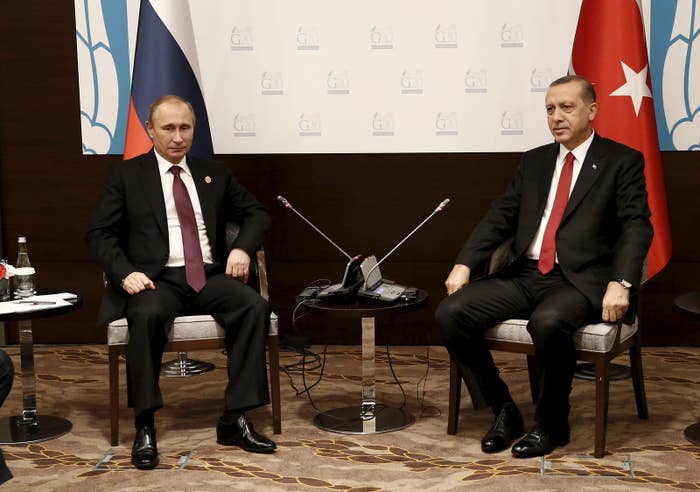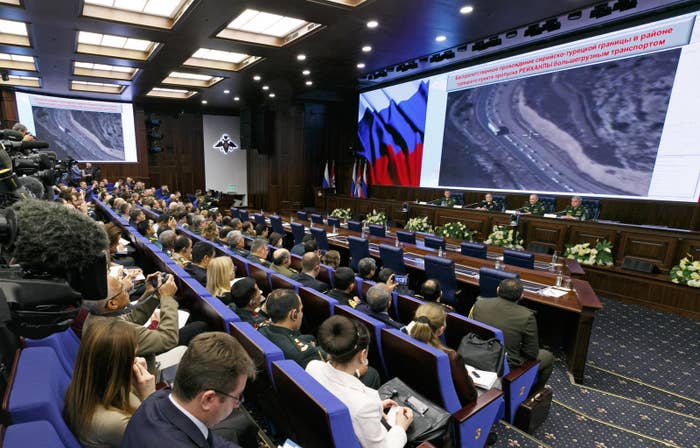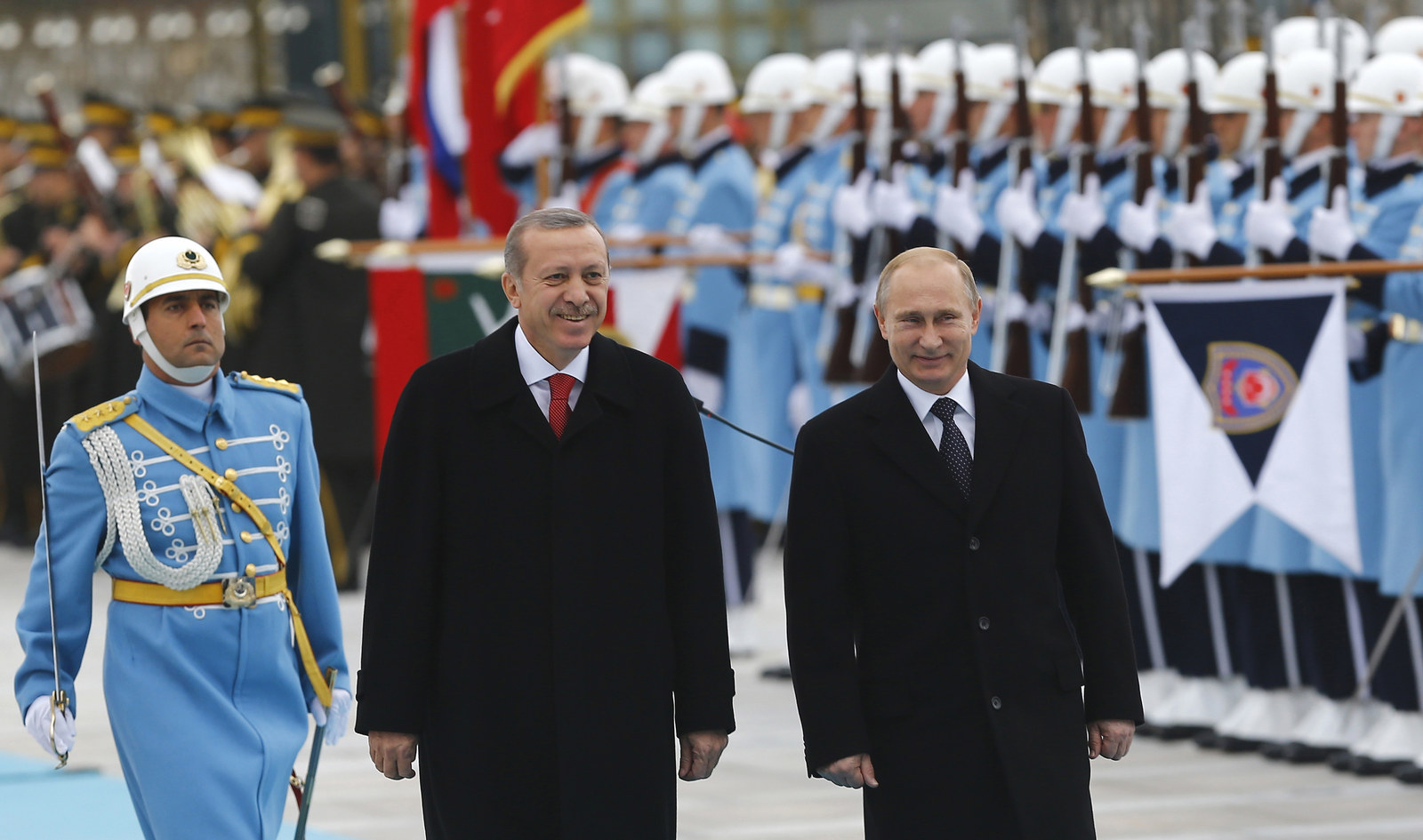
ISTANBUL — After the Turkish air force shot down a Russian warplane last week, relations between the two countries and their prickly, egotistical leaders were always going to deteriorate. But the often surreal and petty war of words has yet to escalate into the serious confrontation many feared.
In a sign of how personal things have become, on Wednesday, Russian President Vladimir Putin’s defense ministry openly accused Turkish President Recep Tayyip Erdogan and his family of profiting personally from the sale of ISIS oil.
Officials showed a series of satellite photos and videos they claimed showed ISIS operatives driving oil trucks along three routes to trading points and oil refineries in southern Turkey, but cited no evidence to back their claim about Erdogan, who had promised to resign if the accusations held up.

"We know the value of his words," Anatoly Antonov, the deputy defense minister, said in a television broadcast. "The leadership, specifically Mr. Erdogan, won't resign, and they won't admit anything, even if their faces are smeared with stolen oil."
Meanwhile, after Putin gave him the cold shoulder at Paris climate talks this week, Erdogan said he was personally hurt that the Russian leader had spurned him and was instead warning of imposing costly sanctions on Turkey. “Putin’s statements about me have always been about my bravery and boldness. He also had many words on my honest statesmanship,” he told reporters. “Russia’s attitude in the aftermath of this incident has not been very diplomatic. It has been sensational. It was also not nice to mention sanctions immediately after the incident.”
The descent into high school antics would be comical if so much wasn’t at stake. But the heightened rhetoric and frosty relations between the countries have damaged already faltering efforts to boost the coalition fighting against ISIS in Syria and Iraq following the November 13 terrorist attacks on Paris. They also clouded international climate talks in Paris that concluded on December 1; both Russian and Turkish insiders reported that world leaders spent much of the time off the dais struggling to cool down the temperature between the two countries.
The descent into high school antics would be comical if so much wasn’t at stake.
Russia has also introduced an array of sanctions on Turkey that threaten Ankara’s annual $6 billion exports. Turkish prime minister Ahmet Davutoglu downplayed the sanctions, arguing that Turkey could find other markets for its produce. But said he worried about any potential cut of Russian gas sales to Turkey. "We have to be prepared for the worst possibility," he added.
Russian commentators have turned the vitriol normally reserved for western countries and Ukraine onto Turkey, warping it from a pleasant holiday destination to a bogey figure. Dmitry Kiselyov, the Kremlin propagandist-in-chief who once gloated about Russia’s ability to turn the U.S. into “radioactive ash,” devoted nearly all of his weekly news magazine show to the dual threat of Turkey, which he called an "abettor of terrorism and at the same time a member of NATO" that was trying to "resurrect the Ottoman Empire."
Others have called on Putin to declare all-out war. One pundit on the state-run Rossiya channel said Moscow's Orthodox Christian heritage gave it the right to seize Istanbul to avenge its capture by the Ottomans in 1453. "We are the heirs of great Byzantium," military expert Semyon Bagdasarov said. "We must take everything we can!" He also called on Russia to arm separatist Kurds as a way to destroy Turkey: “In five to 10 years Turkey will cease to exist as a united state.”
Vladimir Zhirinovsky, a buffoonish ultranationalist lawmaker whose outlandish statements reflect the accepted lunatic fringe in Russia, proposed destroying Turkey's commercial capital instead. "It'd be very easy to destroy Istanbul: you just need to drop one nuclear bomb into the straits, and it'll be washed away,” he told a radio station last week. “It'll be such a terrifying flood. The waves will be 10-15 meters high. The city will be gone, and there are 9 million living there. One stupid move from the president, and the country might disappear."
The transition has been abrupt for many — including even Zhirinovsky, who speaks fluent Turkish and has a degree in Turkish literature. Early indications suggest it may not be enough to push Russia’s relations with Turkey to the point of no return. When Russia announced a ban on Turkish produce this week, it pointedly excluded lemons — which it imports almost solely from Turkey. Nor has Russia floated stopping its billions in gas sales to Turkey, the economic move with the potential to do the most lasting damage.

The highest-profile casualty has been the affinity between Putin and Erdogan, who for saw common ground in each other’s authoritarian tendencies and suspicion of the west. Now Russia’s tightly controlled press is filled with derogatory screeds against Turkey and Erdogan personally. “Erdogan is a gloomy creature and affectedly rather coarse, and he is a macho janissary, or at any rate he wants to appear a macho janissary,” the author Eduard Limonov wrote in the pro-government newspaper Izvestia. “He gives off harsh, hoarse sounds, and many Turks do, I presume, like Erdogan's aggressiveness. He reminds them of cruel Turkish history. He both scares them and inspires them.”
Charter flights to Turkey have already been halted and tour operators have been ordered to stop selling Russian packages to Turkish resort towns, though normal airline flights for travelers have yet to be severed. Putin’s explanation for the travel restrictions was to protect Russians from terrorism. "These measures … are largely connected with a growing terror threat,” Putin spokesman Dmitry Peskov was quoted as saying by the Interfax news agency.
Moscow has ordered Turkish contractors operating in Russia to begin to wrap up their projects and get out. In one incident, a group of 50 Turkish businessmen at a conference in Russia were arrested, fined and ordered out of the country.
Turkey has made conciliatory gestures, returning the body of the Russian pilot killed in the crash back home after observing proper Christian Orthodox rites and repeatedly calling for reconciliation. But Turkey has also been unapologetic about the downing of the jet. It has upped its longstanding accusations that Russia is backing Syrian dictator Bashar al-Assad and aiding in atrocities against Syrian Arabs and its Turkmen kin in the country. "If Turkish airspace had not been violated, such a crisis would not have occurred," Davutoglu said.
A few Turkish pundits have also suggested Ankara could close the straits of Bosphorous and Dardanelles to Russian ship traffic making its way to and from the Black Sea, a move Moscow would likely consider an act of war. Russian state television ran a report warning that if the straits were closed, "Turkey itself could face big problems.” Zhirinovsky, the ultranationalist lawmaker who proposed a nuclear attack, suggested resolving the issue by bombing Istanbul. "As a result we'll have two more paths to the Mediterranean,” he told parliament on Tuesday. “But, alas, there won't be any Istanbul left.”
Other Turks close to the government are saying good riddance to Putin. "Let us not panic in vain; there will be no war,” wrote Nuh Albayrak in a column in the staunchly pro-government Star newspaper. “Although Russia is suffering much more damage than we are, Putin can increase the economic embargo and close the valves in the coldest days of the winter. He will not even hesitate to opt for close cooperation with anyone who works against Turkey. Let this happen. As a bad neighbour, he will do something good. He will rescue us from dependence on them."

